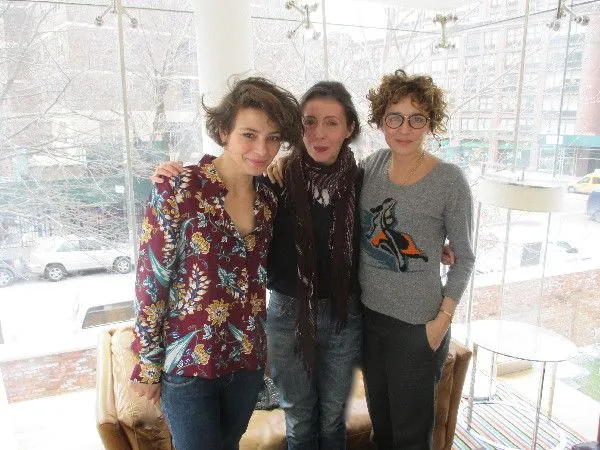 |
| Honey (Miele) star Jasmine Trinca, Anne-Katrin Titze with director Valeria Golino in New York: "As soon as I see glass, I want to film it."
|
Following a whirlwind celebration of Paolo Sorrentino's win for The Great Beauty as Best Foreign Language Film at the Academy of Motion Picture Arts and Sciences' award ceremony on Sunday, I met up with Valeria Golino to discuss her debut feature Honey (Miele). We spoke about breaking boundaries, the meaning of rabbits, the Virgin Mary, Frank Sinatra and Alice In Wonderland.
Honey is played with subtle layers of emotion by Jasmine Trinca who gives the character a searching physicality and the strength of appetite to move forward. We get to glimpse into the life of a young woman who created a world of rituals for herself. Her job is to provide aid to the terminally ill to end their life with dignity. Her personality wishes to dissolve in the function.
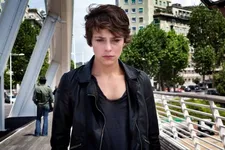 |
| Jasmine Trinca in Honey (Miele) |
Anne-Katrin Titze: You just flew in from Los Angeles last night from the Oscars. Did you celebrate Paolo Sorrentino's win?
Valeria Golino: Four days ago [we arrived in L.A.] from Italy. We were at the Oscars - absolutely to celebrate Paolo.
AKT: Miele, for me, is very much about boundaries. Breaking boundaries, looking at boundaries. Twice you use glass in a particularly interesting way, the round honeycomb glass door panels at the start and then at the bar when Honey is interacting with the guy through the glass.
VG: Glass and boundaries are very often in the movie. It's true. Glass is almost like a metaphor. It's so right away so metaphorical without having to explain anything. It's beautiful in movies to do metaphors by an image without having to talk about them. Making something conceptual like in the beginning. I am on the other side of the rest of the movie you are going to see but I am not going to let you see it yet. And in the bar, between the two, the boy and the girl, everything between them is happening without happening. You kind of can see her character in two minutes by this little game with the glass boundary. Which also for me is a metaphor of today's society - how we don't do anything. Everything is the pantomime of doing something, but it's not happening actually. She's smoking a cigarette which is not there, they're kissing but without doing it. That is on a second level. I don't have to say it. That's why I love reflections and glasses and subjects you can talk about without having to say anything. It's a symbol right away.
AKT: There is a lot in your film that is not spoken about. We get to know Honey through her actions, riding her bike, swimming in the sea. Her solitary activities on the one hand and on the other, her job as the angel of death. The image that stuck in my mind the most is her standing next to the image of the Virgin Mary that hangs on the wall. And she is standing there quietly in her proper shirt and the gloves - the angel of death.
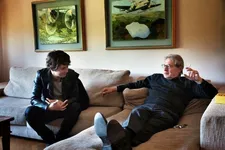 |
| Honey with Grimaldi (Carlo Cecchi) |
VG: She was. She is.
AKT: Or, you could say, the butler of death?
VG: That's lovely. And I put the Virgin Mary there not as a provocation. My movie is not provocation. Provocation doesn't make you talk in depth about things.
AKT: It did not even cross my mind in that scene.
VG: The Virgin Mary is part of this couple's life. They believe in God. It's always with, not against.
AKT: To tell this story in your first film as a director is a bold choice. How did the project come about?
VG: I had just done a little short movie, my first, 15 minutes long. And while I was editing, I read a book which gave me the inspiration. I mean, I wasn't even planning to make another movie right away. I read the book and my first instinct was as an actress. I've been an actress for so long and there was this amazing role. I thought, I get the rights and play the part. The more I was thinking about it in my head, the more I felt I want to make this movie. At the point that I decided to direct it, I was out of the movie already, I didn't choose me. I went through a casting in my head of that role and I didn't want me. I wanted somebody else. I thought a younger woman would be more poignant. I also wanted to film another face, not mine.
AKT: Music plays an important role in your movie. The choice of songs is revealing the characters. The music belongs to them.
VG: It is their music, yes.
Our conversation is now interrupted by a jackhammer on the street below. We are talking over coffee in a beautiful glass box room at the Standard East Village looking out onto the glare of the icy March streets.
VG: You can imagine, my room here is all glass. As soon as I see glass, I want to film it.
AKT: I liked how you used the group of ballet girls. We see them three times, correct? Where were you going with them?
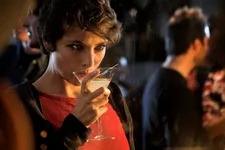 |
| Something sweet |
VG: Three times, yes. Some of the things in the movie were not in the script, I made them up. The ballet girls were already written in because we wanted this choir. Choir is people who talk all together, no?
AKT: Chorus or choir.
VG: A silent choir. Girls who could have been her but were not her. They're in another [realm]. She passes through them, like this phantom a little bit, you know.
AKT: They are together also.
VG: They are together in a femininity which has a different value. It's a different thing from her.
AKT: There is another scene on the train when she overhears women talking and having fun.
VH: Happiness.
AKT: Yes, happiness in female bonding.
VH: I like that. I like to have her around that. The female presence, I wanted her to feel that around her.
AKT: Though she is not really a part of it.
VH: She's not a part of it but she doesn't dislike it. With the African ladies she smiles, she's like "wow", these are sounds of well-being. Moments of well-being she is longing for, too.
AKT: Some form of protection, as well. There is no mother or any other female she really bonds with.
When she meets an older man named Grimaldi (Carlo Cecchi) boundaries begin to break down.
VH: Protection. Belonging. From a female, exactly. Instead, she withdraws, her body withdraws. Instead of outside, she's inside. Her femininity is not… I am attracted to her, she is beautiful but there is something protected about her, not épanoui.
AKT: I spoke with Jasmine [Trinca] about the leather jacket and the "Honey baby blue" toenails. Nothing really is what it seems. The helium balloons in the Happy Birthday or I Love You sets make us think the opposite of what is actually going to happen. At the beginning I thought the camera was taking on the perspective of the dead. The scene in the corridor, is that where you were going?
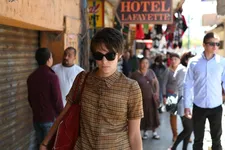 |
| Just passing by. |
VH: I wasn't but I like it. What is great about making films is what the perception of others gives you. I like what you said even if I wasn't thinking of that. I like the suspension of every image there. That's why I wanted to become a director. For the images. How to you see the point of view? The fact that it gave you this impression, I think is lovely.
AKT: Honey watches a movie in the hotel room in LA. In the clip you chose, a man says "All of those faces would be me." What is she watching?
VH: A noir. It's a Frank Sinatra movie. They gave me a list of movies you could get for not too much money to show. A lot of the movies are old and I wanted Frank Sinatra because in the book [ "A Nome Tuo" by Mauro Covacich] there was a reference to him and I didn't put it in.
AKT: The piece of dialogue you chose for the clip fits so nicely with your theme.
VH: I'm so glad you are asking me these questions. For example with the shadows, his shadow, her shadow, they touching their shadows - it's not important to the plot but it's very important to me. Very rarely they ask me. Usually we just talk about euthanasia.
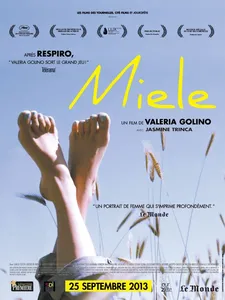 |
| Honey (Miele) original poster. |
AKT: Oh, yeah, we didn't talk about euthanasia at all!
VH: I'm glad! It's about that, too. But this is not my movie.
AKT: What about the "Rabbit" who connects Honey with her customers?
VH: She calls them little rabbits because it's a way of not taking responsibility, of taking the risk of helping somebody die. So she calls them the rabbits because they're fearful.
AKT: Is there also an Alice In Wonderland reference in the naming, the always late rabbit?
VH: Again, there wasn't but it's beautiful.
AKT: Apropos beauty, I am thrilled that The Great Beauty won the Oscar on Sunday. I have been telling everyone to see it ever since my conversation with Paolo last fall.
VH: I was going to protest if he didn't win. I'm part of the Academy, I vote for the Oscar. I said if Paolo doesn't win, I'm going to protest.
Honey (Miele) opens in New York on March 7 at the Film Society of Lincoln Center's Elinor Bunin Munroe Film Center.
























